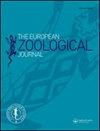浮游食性鱼幼鱼对微塑料微粒定殖细菌群落分类多样性的影响
IF 1.4
4区 生物学
Q2 ZOOLOGY
引用次数: 0
摘要
摘要很少有研究调查鱼类对微塑料颗粒降解速率的影响。可以预期,它们的作用可能不仅是直接的,通过消化和通过肠道,而且是间接的,通过改变MPs表面细菌群落的密度和组成。这项研究旨在测试鱼类的存在对水化学参数以及定居在MPs中的水生细菌的丰度和遗传多样性的短期影响,这可能有助于它们更快地降解。这在一式三份的实验中进行了测试,每次重复在存在或不存在球形MPs、聚苯乙烯(Ps)或聚乙烯(Pe)以及存在或不具有鲈鱼的情况下持续10天。用浮游生物网将这只动物与MP隔开。我们使用16S rRNA基因(16S rDNA)测序确定了水的化学参数、水中和MPs表面的细菌数量、水中细菌和MPs上细菌的分类多样性,并使用扫描电子显微镜确定了MPs表面的变化。接触鱼类会增加水中铵、硝酸盐和正磷酸盐的浓度以及细菌的数量,这反过来又会导致MPs表面细菌丰度和家族级分类群数量的增加。在Pe的情况下,鱼类分泌物对MPs表面细菌丰度的积极影响大于Ps。在实验过程中,观察到的影响对任何类型的塑料中的MPs表面都没有影响,但它们可能在比施用时间更长的时间内对MPs的分解起到重要作用。本文章由计算机程序翻译,如有差异,请以英文原文为准。
The effect of planktivorous fish (juvenile Perca fluviatilis) on the taxonomic diversity of microplastic particles-colonized bacterial community
Abstract Very few studies have investigated the influence of fish on the degradation rate of microplastic particles (MPs). It could be expected that their effect might be not only direct, through digestion and passage through the gut, but also indirect, through the alteration of the density and composition of the bacterial community on the surface of MPs. This study aims to test the short-term effects of fish presence altering the water chemical parameters and the abundance and genetic diversity of the aquatic bacteria colonising MPs, which may contribute to their faster degradation. This was tested in a triplicate experiment, with each replicate lasting 10 days in the presence or absence of spherical MPs, polystyrene (Ps) or polyethylene (Pe) and the presence or absence of a perch. The animal was separated from the MPs with a plankton net. We determined the chemical parameters of the water, the number of bacteria in the water and on the MPs’ surface, the taxonomic diversity of bacteria in the water and those present on the MPs using 16S rRNA gene (16S rDNA) sequencing, and the alterations of the MPs’ surface using a scanning electron microscope. The exposure to fish increased the concentration of ammonium, nitrates, and orthophosphates and the number of bacteria in the water, which in turn resulted in an increase in the abundance of bacteria and the number of taxa at the family level on the MPs’ surface. The positive effect of fish exudates on the abundance of bacteria on MPs’ surface was greater in the case of Pe than in Ps. The observed effects did not affect the MPs’ surface in any of the types of plastic during the experiment, but they may play a significant role in MPs decomposition over a longer than applied time period.
求助全文
通过发布文献求助,成功后即可免费获取论文全文。
去求助
来源期刊

European Zoological Journal
Agricultural and Biological Sciences-Animal Science and Zoology
CiteScore
3.10
自引率
5.60%
发文量
80
审稿时长
30 weeks
期刊介绍:
The European Zoological Journal (previously Italian Journal of Zoology) is an open access journal devoted to the study of all aspects of basic, comparative and applied protozoan and animal biology at molecular, cellular, tissue, organ, organismal, population, and community-ecosystem level. Papers covering multiple levels of organization and integrative approaches to study animal form, function, development, ecology, evolution and systematics are welcome. First established in 1930 under the name of Il Bollettino di Zoologia, the journal now has an international focus, reflected through its global editorial board, and wide author and readership.
 求助内容:
求助内容: 应助结果提醒方式:
应助结果提醒方式:


